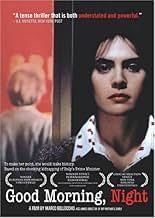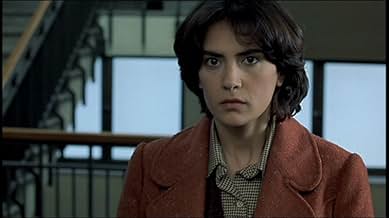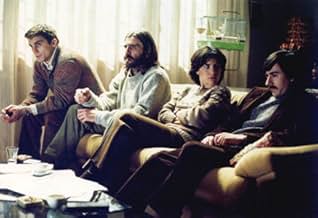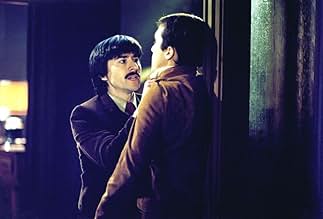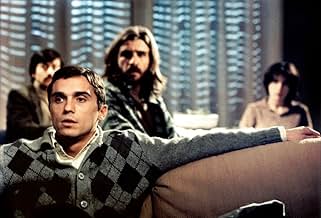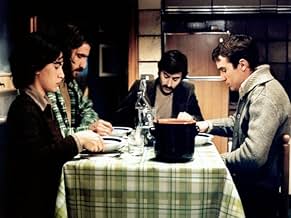VALUTAZIONE IMDb
7,1/10
4203
LA TUA VALUTAZIONE
Il rapimento del 1978 del politico Aldo Moro visto dal punto di vista di uno dei suoi aggressori: una giovane donna che combatteva tra le fila delle Brigate Rosse.Il rapimento del 1978 del politico Aldo Moro visto dal punto di vista di uno dei suoi aggressori: una giovane donna che combatteva tra le fila delle Brigate Rosse.Il rapimento del 1978 del politico Aldo Moro visto dal punto di vista di uno dei suoi aggressori: una giovane donna che combatteva tra le fila delle Brigate Rosse.
- Regia
- Sceneggiatura
- Star
- Premi
- 13 vittorie e 21 candidature totali
Giulio Bosetti
- Paolo VI
- (as Giulio Stefano Bosetti)
Recensioni in evidenza
"Good Morning, Night (Buongiorno, notte)" is an intriguing effort to understand terrorists.
Loosely based on a novel, writer/director Marco Bellocchio specifically re-imagines the kidnapping of Italian party leader Aldo Moro in 1987, with heavy use of television clips. The quaintly naive Cold War rhetoric, emphasized with odd historic black and white newsreel interstices such as of Stalinist parades, may now be seen as an examination of a symbolic precursor for today's gruesome politics, though he was already working on the film at 9/11.
The young idealists we are first introduced to seem as harmless as the radical pranksters in the contemporary "The Edukators (Die Fetten Jahre sind vorbei)." While it's a jolt to gradually learn their connection to the violent attack, first revealed as they cheer at the initial TV coverage, they seem so bumbling and nervous (one takes leave abruptly for, as it were, a conjugal visit as he feels he's the one being imprisoned; another gets fixated on an overly symbolic pet caged bird), it's never clear if they personally committed murder or if they're just the guardian cell taking orders from those who stage the mock trial and pull the triggers or if that is a moral difference that is intentionally considered irrelevant.
Real world politics do occasionally seep through in silent background commentary, through factory strikes and sarcastic graffiti, but the determined ideologues reject these actions as they see themselves as the true believers. Ironically, the drone of the TV coverage, with reports of related and unrelated violent acts around the country, they anxiously watch becomes as much a recitation as the opening pitch from the bored apartment rental agent.
Their Red Brigade aims seem so diffuse about intending to set off revolutions and counter-revolutions, compared to the more direct motives of the terrorists in "Paradise Now" (let alone how kidnapping has devolved into a business, as in "Secuestro Express"), at least to those not intimately familiar with Italian political dialectics, that it seems more understandable than ludicrous that the negotiations draw on. A long side bar scene where one of the kidnappers joins her family in a memorial service for World War II partisans nostalgically singing an anti-Fascist anthem, inspiring her to read a collection of letters resistance fighters wrote before their executions instead of her usual Lenin or Engels reading, makes the dialectics even more ironic as to what fascist behavior is. Her internal struggle to resolve these pressures, including several confusing dream sequences, is the core of the film and Maya Sansa, with very expressive eyes, is captivating as "Chiara."
The kidnapping itself takes on a "Ransom of Red Chief" feel as the Aldo Moro character, well-played by Roberto Herlitzka and the point of the film's dedication to the auteur's father, is much more of an eloquent, dignified, paternal humanist statesman than a typical politician. The kidnappers seem to be thwarted in provoking political crisis because he will only write personal, non-political notes to his family, particularly his grandson (even if does seem as if he's writing love notes to his mistress rather than to his wife). But his appeal to the pope and the pope's involvement in the negotiations and their aftermath seems as incongruous as an odd séance by political supporters or the kidnappers doing a blessing before eating. Compared to the director's earlier "My Mother's Smile (L'Ora di religione: Il sorriso di mia madre)," religion is only an ancillary issue.
The auteur's voice, as an artist, seems to speak through a somewhat naive and flirtatious friend of "Chiara"s who has written a screenplay about radicals and quotes the Emily Dickinson poem that inspired the title. He argues that the imagination can be a powerful force in influencing people, though of course the authorities misinterpret his involvement.
I saw it with a defective soundtrack, but other than odd musical commentary with bombastic selections from "Aida" and Pink Floyd, the film's strength is faces and looking into the eyes of deluded cogs in the wheel of historical forces, though the best sequence is given away in the trailer.
Loosely based on a novel, writer/director Marco Bellocchio specifically re-imagines the kidnapping of Italian party leader Aldo Moro in 1987, with heavy use of television clips. The quaintly naive Cold War rhetoric, emphasized with odd historic black and white newsreel interstices such as of Stalinist parades, may now be seen as an examination of a symbolic precursor for today's gruesome politics, though he was already working on the film at 9/11.
The young idealists we are first introduced to seem as harmless as the radical pranksters in the contemporary "The Edukators (Die Fetten Jahre sind vorbei)." While it's a jolt to gradually learn their connection to the violent attack, first revealed as they cheer at the initial TV coverage, they seem so bumbling and nervous (one takes leave abruptly for, as it were, a conjugal visit as he feels he's the one being imprisoned; another gets fixated on an overly symbolic pet caged bird), it's never clear if they personally committed murder or if they're just the guardian cell taking orders from those who stage the mock trial and pull the triggers or if that is a moral difference that is intentionally considered irrelevant.
Real world politics do occasionally seep through in silent background commentary, through factory strikes and sarcastic graffiti, but the determined ideologues reject these actions as they see themselves as the true believers. Ironically, the drone of the TV coverage, with reports of related and unrelated violent acts around the country, they anxiously watch becomes as much a recitation as the opening pitch from the bored apartment rental agent.
Their Red Brigade aims seem so diffuse about intending to set off revolutions and counter-revolutions, compared to the more direct motives of the terrorists in "Paradise Now" (let alone how kidnapping has devolved into a business, as in "Secuestro Express"), at least to those not intimately familiar with Italian political dialectics, that it seems more understandable than ludicrous that the negotiations draw on. A long side bar scene where one of the kidnappers joins her family in a memorial service for World War II partisans nostalgically singing an anti-Fascist anthem, inspiring her to read a collection of letters resistance fighters wrote before their executions instead of her usual Lenin or Engels reading, makes the dialectics even more ironic as to what fascist behavior is. Her internal struggle to resolve these pressures, including several confusing dream sequences, is the core of the film and Maya Sansa, with very expressive eyes, is captivating as "Chiara."
The kidnapping itself takes on a "Ransom of Red Chief" feel as the Aldo Moro character, well-played by Roberto Herlitzka and the point of the film's dedication to the auteur's father, is much more of an eloquent, dignified, paternal humanist statesman than a typical politician. The kidnappers seem to be thwarted in provoking political crisis because he will only write personal, non-political notes to his family, particularly his grandson (even if does seem as if he's writing love notes to his mistress rather than to his wife). But his appeal to the pope and the pope's involvement in the negotiations and their aftermath seems as incongruous as an odd séance by political supporters or the kidnappers doing a blessing before eating. Compared to the director's earlier "My Mother's Smile (L'Ora di religione: Il sorriso di mia madre)," religion is only an ancillary issue.
The auteur's voice, as an artist, seems to speak through a somewhat naive and flirtatious friend of "Chiara"s who has written a screenplay about radicals and quotes the Emily Dickinson poem that inspired the title. He argues that the imagination can be a powerful force in influencing people, though of course the authorities misinterpret his involvement.
I saw it with a defective soundtrack, but other than odd musical commentary with bombastic selections from "Aida" and Pink Floyd, the film's strength is faces and looking into the eyes of deluded cogs in the wheel of historical forces, though the best sequence is given away in the trailer.
Based on a novel, the film describes the situation of Aldo Moro during his captivity. There is more than a meticulous realistic point of view given in this film : it tries to figure thoughts and attitudes of the kidnappers, members of brigate rosse. It explores the contradictions of hidden activists who are desperately trying to justify violent actions by the salvation of proletariat and rise of a social justice. They are seen in their loneliness, especially on the affective, emotional side. The psycho-rigidity of their mind is patent, not only in the sententious talks to their prisoner, in a certain desperate naivety to seek echos of their action in public opinion throughout medias, but also in the way they rule relationships. It's not politically that Moro's character strongly opposes to his kidnappers' characters, but rather in the way he's emotionnaly tied to his family (although being a prisonner, he can write letters), while the others seem alienated facing their own families (Mariano pretends to have cut any link to his son, Chiara tries to avoid familial phone calls and meetings, another member is mad about being away of his girl and suffers to be away from her mind and point of view when he sees her). Together, those members don't look like a family of a new kind. Maybe is it the main limit of Bellochio's movie, not to explore the way such an internal and autistic logical builds inside radical groups. But the movie spots a clearly defined place and time, focusing exclusively on elements linked to Moro's detention in a casual apartment (the gunfight of the kidnapping and then the death of the prisonner are seen indirectly throughout television). The strength of the movie is to develop a symbolic aspect with the character of Chiara's colleague (of her cover work) who defends imagination against the brutality of autocratic arbitrary. Almost fantastically, this character seems to guess Chiara's situation, writing a fiction about the events (like the movie we're effectively seeing as spectators) and modifying her feelings : when she realizes how any execution is horrible and unfair (reminding executions of italian partisani of WWII), it's too late and there is no other escape than in her own imagination (dream-like scene that the film also shows us). I believe it's a good and clever way to introduce us into such a historical event (maybe still wounding italian society), imagination. I also like the aspects and details of the movie that describe the importance of christianity in the conscience of the italians (even marxists ones, subconsciously) and critizises the sacrificial consensus into a falsely ineluctable execution but real murder.
The true story of the kidnap of Italian political leader Aldo Moro by the Red Brigades in 1978 is turned into a haunting, disturbing tone poem of s film.
Eschewing realism, or the obvious tense, linear approach, this focuses on the experience through the eyes of one the young kidnappers, and her ever growing doubts about the righteousness of the mission. But rather than express this literally, we see it emerge in dream sequences, and behind her eyes.
Beautifully shot, with a terrific use of classical and modern music (Pink Floyd shows up more than once) this quiet nightmare of a film is far more effecting and thought provoking than most political dramas. It does not miss the irony that Aldo was a humanist who was actually inviting the communist party to be part of the government.
A great cautionary truth based fable about the danger of giving yourself completely and unquestioningly to any ideology, left or right, religious or secular.
Eschewing realism, or the obvious tense, linear approach, this focuses on the experience through the eyes of one the young kidnappers, and her ever growing doubts about the righteousness of the mission. But rather than express this literally, we see it emerge in dream sequences, and behind her eyes.
Beautifully shot, with a terrific use of classical and modern music (Pink Floyd shows up more than once) this quiet nightmare of a film is far more effecting and thought provoking than most political dramas. It does not miss the irony that Aldo was a humanist who was actually inviting the communist party to be part of the government.
A great cautionary truth based fable about the danger of giving yourself completely and unquestioningly to any ideology, left or right, religious or secular.
Marco Bellocchio takes a lot of chances in his films, examining human behavior in the face of dissension whether political, moral, or emotional. In 'Buongiorno, notte' ('Good Morning, Night') he studies the infamous 1978 kidnapping of Aldo Moro in what would be a situation that would raise as many questions as it gave answers - and it is that quality that Bellocchio has captured in his film.
The facts of the Italian political current in 1978 may not be understood by the general viewer, but suffice it to say that the ruling political party Democrazia Cristiana was challenged by the Red Brigade, the underground terrorists who kidnapped and killed President Aldo Moro in a coups that was eventually destroyed by the reigning powers. That much of a plot is all that is necessary to know. The bulk of the film revolves around the lives of the kidnappers, especially the sole woman Chiara (Maya Sansa) who with her compatriots hid the President in a tiny room with the threat of death, but also were influenced by the writings and conversations with Moro. The whole question of revolution is under close inspection. The story mixes documentary shots with the cinematography in a tasteful way of showing us the elements of the kidnapping and the aftermath. It is the reaction of Chiara to these events and the questioning that can disrupt the political leanings of revolutionaries that makes this story so very meaningful.
The cast is superb: Maya Sansa, Pier Giorgio Bellocchio, Giovanni Calcagno, Luigi Lo Cascio and Paolo Briguglia as the kidnappers, and Roberto Herlitzka as Aldo Moro are convincing and human. The script does have holes in it where formation of ideas and acts and incidents are vague, but it almost seems as though that is the intention of Bellocchio. In political upheaval nothing is black and white if the events are related through individual's eyes rather that through the reaction of the mobs. And this is what makes the film so fine, if a bit hard to follow.
The facts of the Italian political current in 1978 may not be understood by the general viewer, but suffice it to say that the ruling political party Democrazia Cristiana was challenged by the Red Brigade, the underground terrorists who kidnapped and killed President Aldo Moro in a coups that was eventually destroyed by the reigning powers. That much of a plot is all that is necessary to know. The bulk of the film revolves around the lives of the kidnappers, especially the sole woman Chiara (Maya Sansa) who with her compatriots hid the President in a tiny room with the threat of death, but also were influenced by the writings and conversations with Moro. The whole question of revolution is under close inspection. The story mixes documentary shots with the cinematography in a tasteful way of showing us the elements of the kidnapping and the aftermath. It is the reaction of Chiara to these events and the questioning that can disrupt the political leanings of revolutionaries that makes this story so very meaningful.
The cast is superb: Maya Sansa, Pier Giorgio Bellocchio, Giovanni Calcagno, Luigi Lo Cascio and Paolo Briguglia as the kidnappers, and Roberto Herlitzka as Aldo Moro are convincing and human. The script does have holes in it where formation of ideas and acts and incidents are vague, but it almost seems as though that is the intention of Bellocchio. In political upheaval nothing is black and white if the events are related through individual's eyes rather that through the reaction of the mobs. And this is what makes the film so fine, if a bit hard to follow.
Aldo Moro's kidnapping and murder was at its time a huge event for the Italian history and the world. With the recrudescence of terrorism at the beginning of the 70s, some of the extreme left movements in Europe - especially in Germany and Italy - embraced the path of the 'armed struggle', a deformation of the Marxist concept of class struggle in a try to stop the historical reconciliation between the traditional political parties and an Italian Comminist Party already feeling the winds of reform that will melt down the Iron Curtain 10-15 years later.
Marco Bellocchio's film tackles the story from the perspective of the day to day life of the kidnappers, and through the eyes and dreams of one of the kidnappers - the only female in the group. We do not see any of the bloody events of the kidnapping or the outcome, and most of the action happens in the rented flat where the captors kept Moro imprisoned. The director and the splendid main actress Maya Sansa succeed to re-create the political conditioning and the motivations that brought the young woman to join the terrorist fighting path, but also the human dimension that brings her back the feelings of compassion to the victim. It is Aldo Moro's portrait played by Roberto Herlitzka which seems surprinsigly more sketchy, and I had the feeling that a greater message about the relationship between kidnapper and victim was missed.
It is still an interesting movie to watch, minor in style but human, dealing from a different perspective with a theme that too often generated films that were spectacular, but deprived of any true emotion. 8 out of 10 on my personal scale.
Marco Bellocchio's film tackles the story from the perspective of the day to day life of the kidnappers, and through the eyes and dreams of one of the kidnappers - the only female in the group. We do not see any of the bloody events of the kidnapping or the outcome, and most of the action happens in the rented flat where the captors kept Moro imprisoned. The director and the splendid main actress Maya Sansa succeed to re-create the political conditioning and the motivations that brought the young woman to join the terrorist fighting path, but also the human dimension that brings her back the feelings of compassion to the victim. It is Aldo Moro's portrait played by Roberto Herlitzka which seems surprinsigly more sketchy, and I had the feeling that a greater message about the relationship between kidnapper and victim was missed.
It is still an interesting movie to watch, minor in style but human, dealing from a different perspective with a theme that too often generated films that were spectacular, but deprived of any true emotion. 8 out of 10 on my personal scale.
Lo sapevi?
- QuizWas appreciated by the relatives of Aldo Moro.
- BlooperNear the end, when Aldo Moro walks away in the deserted street, you can see a multicolored Peace flag in the background. Those flags would decorate Italian streets only in 2003, to oppose the invasion of Iraq.
- ConnessioniEdited from Paisà (1946)
- Colonne sonoreMarcia trionfale
(from "Aida")
Composed by Giuseppe Verdi
Performed by Orchestra e Coro del Teatro dell'Opera di Roma
Conducted by Georg Solti
Decca Records, 1962
I più visti
Accedi per valutare e creare un elenco di titoli salvati per ottenere consigli personalizzati
- How long is Good Morning, Night?Powered by Alexa
Dettagli
- Data di uscita
- Paese di origine
- Lingua
- Celebre anche come
- Good Morning, Night
- Aziende produttrici
- Vedi altri crediti dell’azienda su IMDbPro
Botteghino
- Lordo Stati Uniti e Canada
- 10.093 USD
- Fine settimana di apertura Stati Uniti e Canada
- 2769 USD
- 13 nov 2005
- Lordo in tutto il mondo
- 4.240.918 USD
- Tempo di esecuzione1 ora 46 minuti
- Colore
- Mix di suoni
- Proporzioni
- 1.66 : 1
Contribuisci a questa pagina
Suggerisci una modifica o aggiungi i contenuti mancanti

Divario superiore
By what name was Buongiorno, notte (2003) officially released in India in English?
Rispondi
